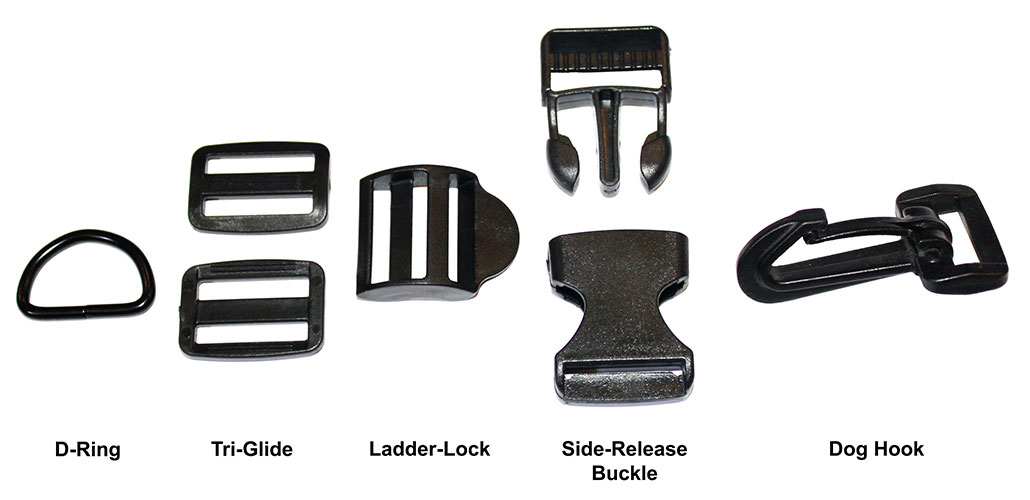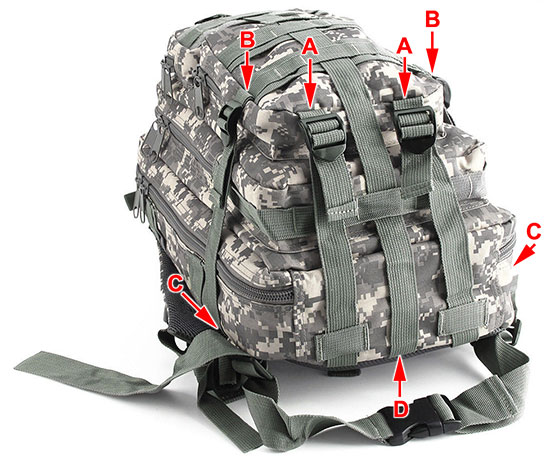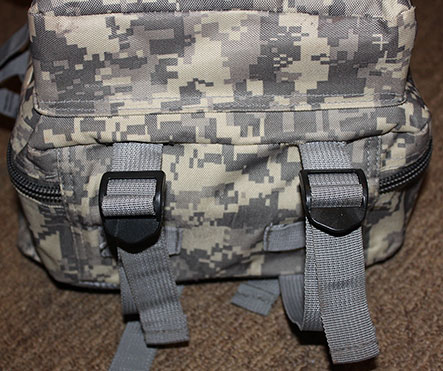Difference between revisions of "Backpack"
(→Removing Unnecessary Straps) |
(→Removing Unnecessary Straps) |
||
| Line 14: | Line 14: | ||
==Removing Unnecessary Straps== | ==Removing Unnecessary Straps== | ||
| − | + | The bag has a lot of compression straps to squash it down when it's not full, and stop things rattling about inside. Seeing as it ''is'' going to be completely filled, I decided to remove most of these, along with the waist and chest straps, because I'm not planning on hiking long distances, or carrying a lot of weight that needs to be firmly attached to ''me''. | |
| − | Doing this gets rid of | + | Doing this gets rid of extra straps that get in the way when you just want to open the bag, or get tangled up in things when moving it around. It also provides some webbing and fittings that can be re-purposed to tailor the bag more to FPV use. |
[[File:Straps-removed.jpg]] | [[File:Straps-removed.jpg]] | ||
| − | + | * Remove straps at A, B and D and stitch the seams back up again. Undo the two arms of the Y-shaped top of the strap you removed at D. | |
| + | * Open the seams at C to remove the side compression-straps, ''and'' the waist strap, ''and'' the triangular pieces where the bottoms of the shoulder-straps are attached. Leave these seams open for now. If you have sewing pins you can use them to stop the seams from opening up further as you work on the rest of the bag. | ||
| − | + | [[File:Bottom-straps-reattached.jpg]] | |
| − | + | ||
| − | + | Take the straps that attached at A, and unthread the now free ends, so that you can pass them through the short lengths of webbing sewn to the bottom of the bag. Open up the seam shown above, and re-assemble/re-attach the straps there (this allows us to strap something securely to the bottom of the bag, without compressing or forcing the whole of the bottom inward). | |
==Fixing the Shoulder Straps== | ==Fixing the Shoulder Straps== | ||
Revision as of 17:22, 28 August 2017
I bought one of the cheap backpacks recommended by Stew from UAVFUTURES, for carrying FPV Multi-rotor gear.
However, as I own a sewing machine and a box full of spare rucksack fittings, I figured I could make some improvements.
(There are a whole load of different Ebay sellers, selling bags from several different manufacturers. As there are slight differences between manufacturers, you may not end up with one exactly like this.)
Contents
What All the Plastic Bits are Called
In case you need to buy extras (add 'webbing' to your search, to avoid getting lots of other stuff):
Removing Unnecessary Straps
The bag has a lot of compression straps to squash it down when it's not full, and stop things rattling about inside. Seeing as it is going to be completely filled, I decided to remove most of these, along with the waist and chest straps, because I'm not planning on hiking long distances, or carrying a lot of weight that needs to be firmly attached to me.
Doing this gets rid of extra straps that get in the way when you just want to open the bag, or get tangled up in things when moving it around. It also provides some webbing and fittings that can be re-purposed to tailor the bag more to FPV use.
- Remove straps at A, B and D and stitch the seams back up again. Undo the two arms of the Y-shaped top of the strap you removed at D.
- Open the seams at C to remove the side compression-straps, and the waist strap, and the triangular pieces where the bottoms of the shoulder-straps are attached. Leave these seams open for now. If you have sewing pins you can use them to stop the seams from opening up further as you work on the rest of the bag.
Take the straps that attached at A, and unthread the now free ends, so that you can pass them through the short lengths of webbing sewn to the bottom of the bag. Open up the seam shown above, and re-assemble/re-attach the straps there (this allows us to strap something securely to the bottom of the bag, without compressing or forcing the whole of the bottom inward).
Fixing the Shoulder Straps
These are probably the worst thing about these cheap bags, because the straps keep pulling out of the D-rings the top:
...and the bottoms are far more complicated than they need to be, with a D-ring + tri-glide at the bottom to change the length, and then a buckle in the middle where the length can also be changed.
At the top I took the webbing out of the D-rings, threaded the strap up through a tri-glide (the one I removed from the bottom end of the shoulder-strap) then the rings, and then back down through the tri-glide. The double thickness of webbing holds solidly.
(I could have put ladder locks at the top of the shoulder-straps, but didn't want to remove and then replace all the stitching, so kept the D-rings.)
What's inside
The bigger version of the Turnigy transmitter + goggles case (320x220x110mm).



